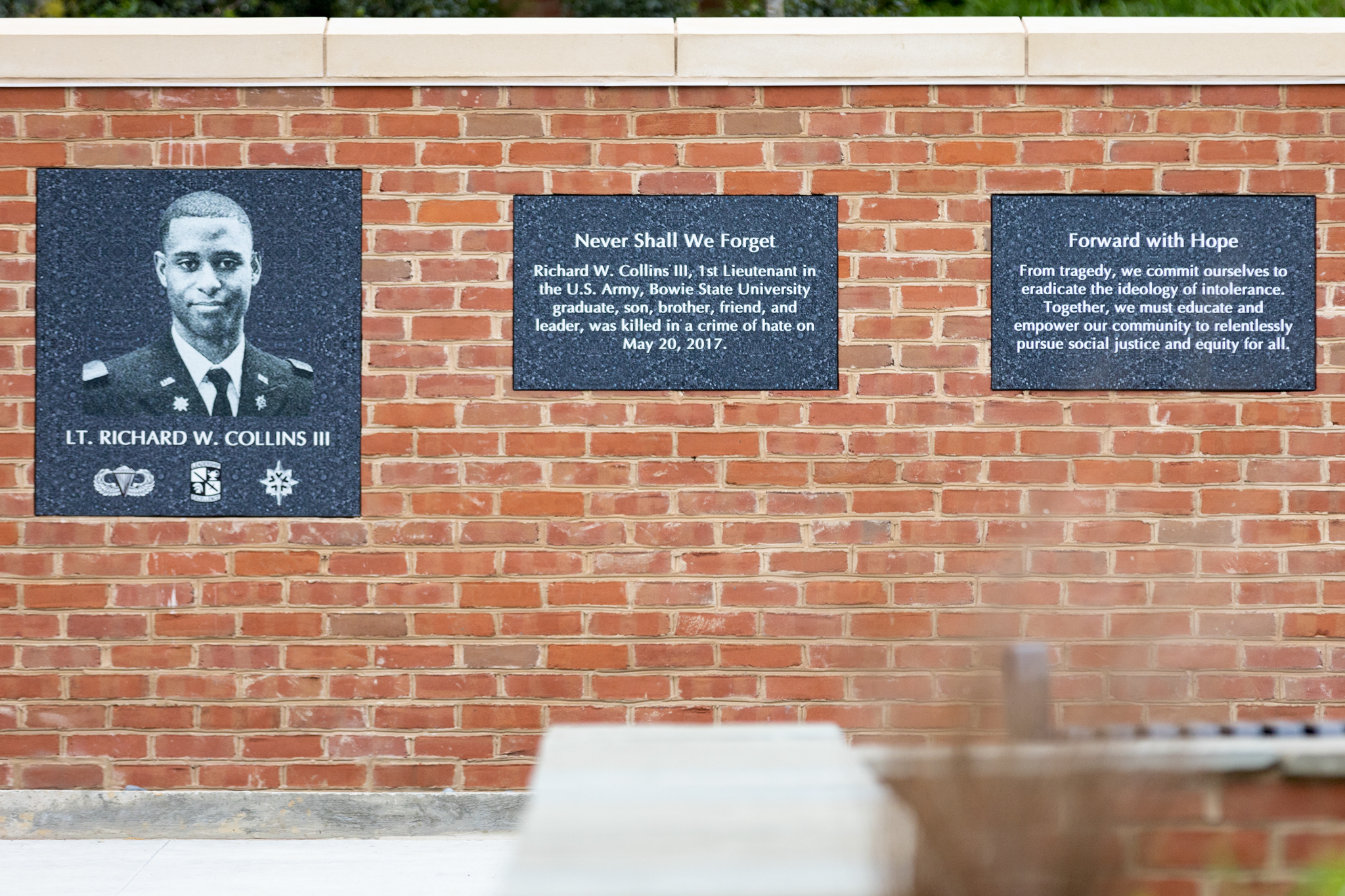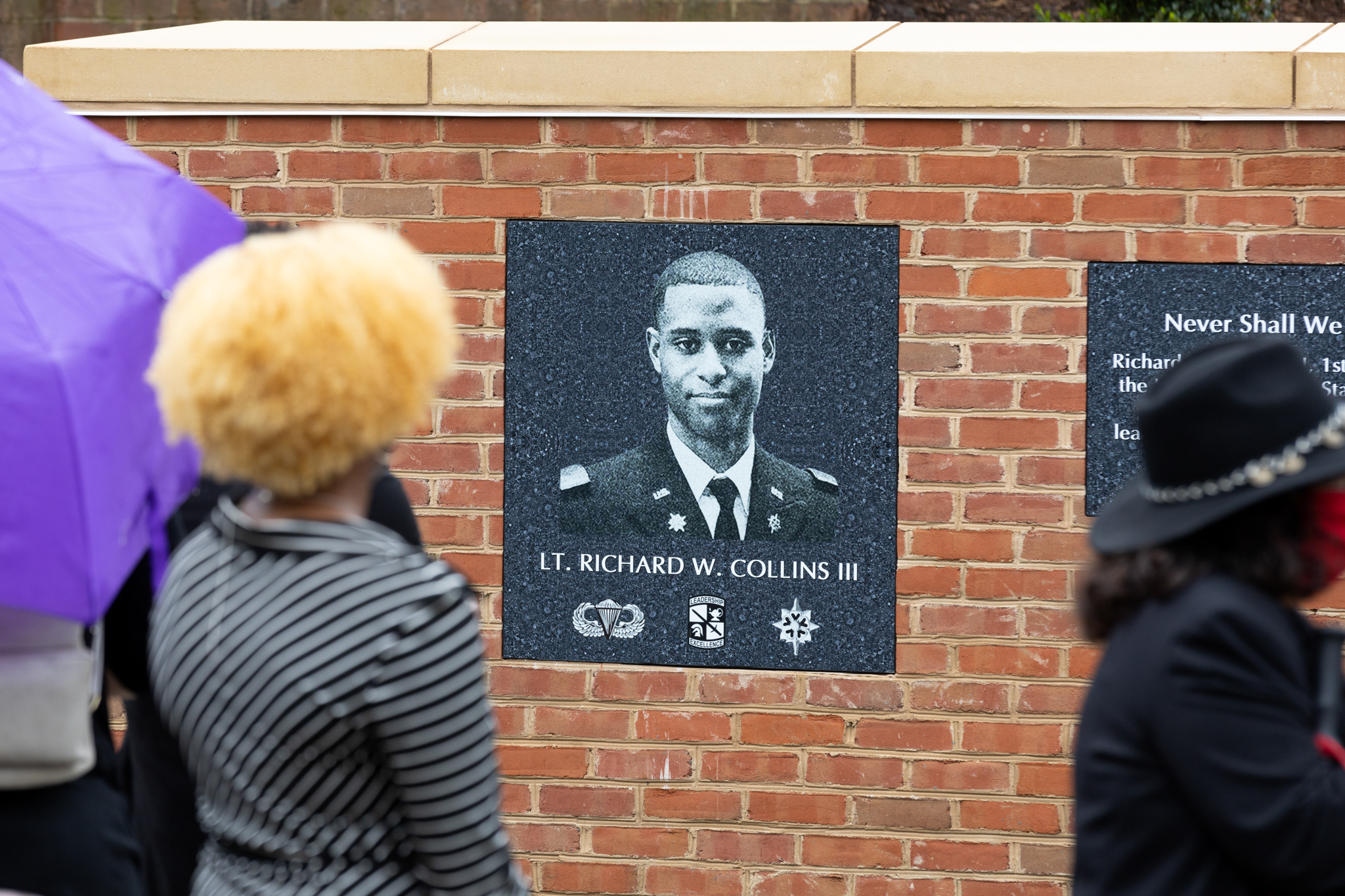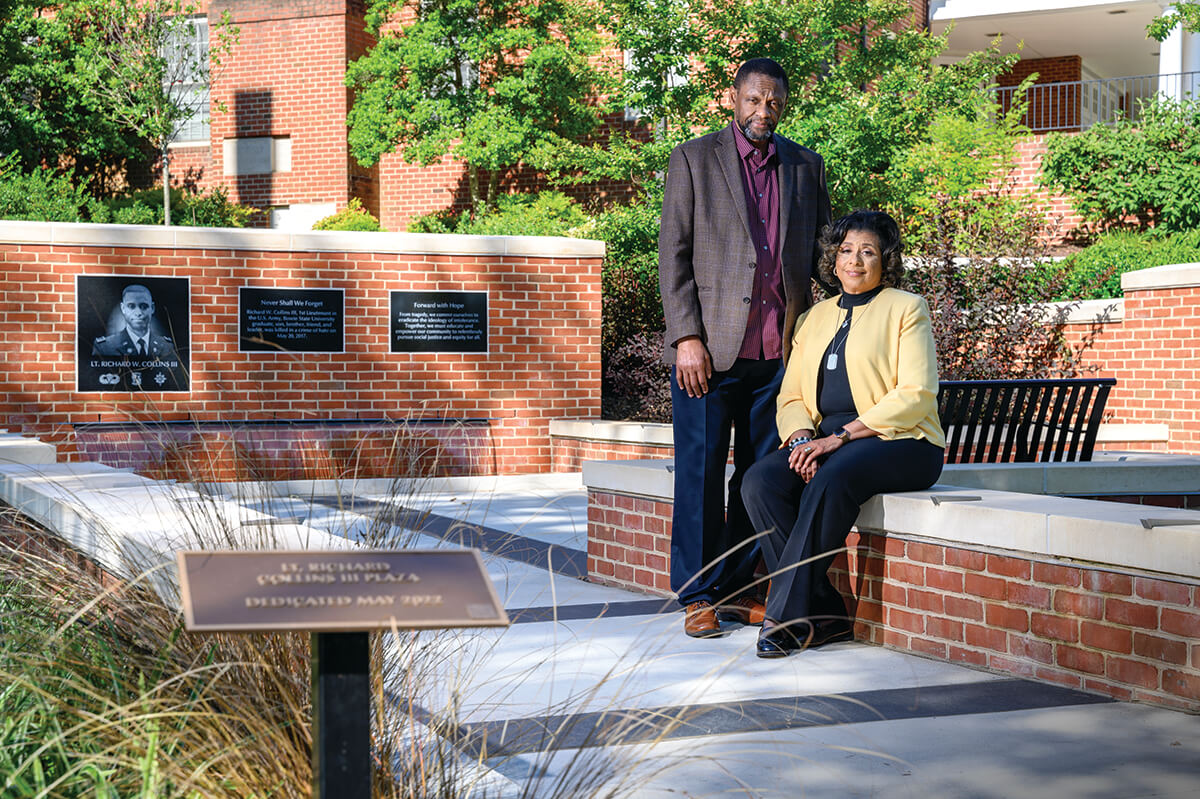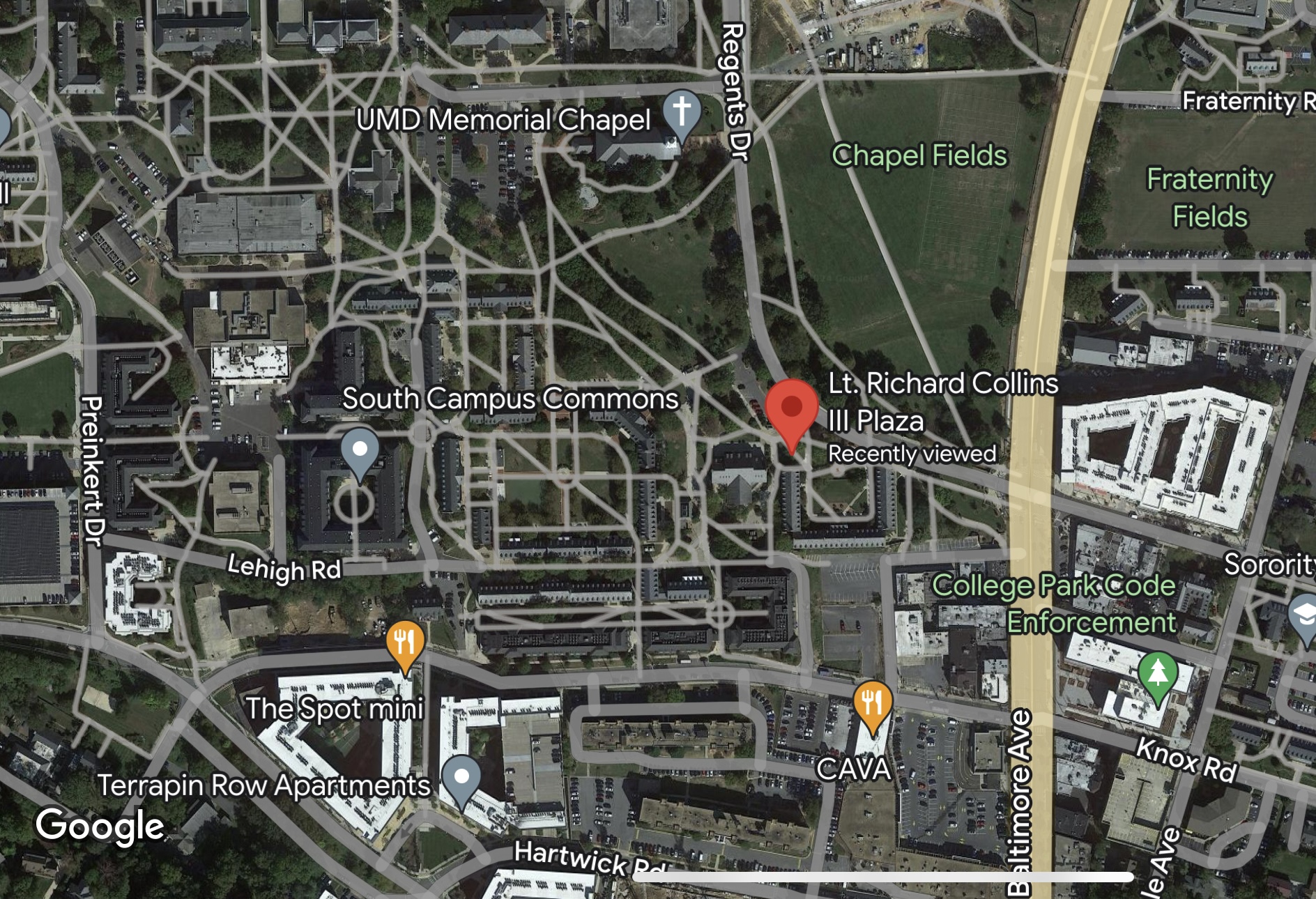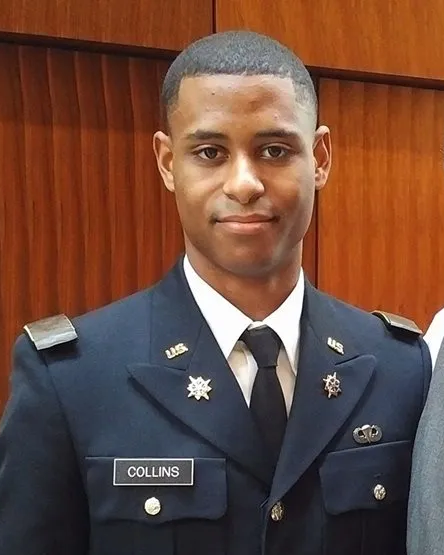
“Strong, smart, patriotic, & loyal”: The Murder of Lt. Richard Collins III (Part 2)
This interview is published in memory of Lt. Richard Collins III: the third subject in our series, “Unfinished Stories”.
~
TW: Descriptions of violent death, hate crimes, grief, and racism
~
As we established in Part 1, Lt. Richard Collins III was a hard-working and beloved community member with nowhere to go but up. He was only days away from graduating from Bowie State University and beginning his career in the U.S. Army. He had dreams of becoming an intel officer and one day becoming a high-ranking general. He was certain he would get there.
These dreams were shattered at a bus stop at the University of Maryland College Park, where Lt. Collins was murdered by a student with ties to alt-right groups on social media. His killer was charged with first degree murder and a hate crime. However, the judge dismissed the hate crime charge on what was essentially a technicality: at the time, hate had to be the sole motivating factor in a crime for the charge to go through.
Thanks to Dawn and Rick Collins, that technicality was completely eliminated. After the trial of Richard’s murderer, Dawn and the Collins family began a campaign to change the hate crime legislation in Maryland: it couldn’t help her son or their family, but they wanted to make sure that such a devastating outcome from a technicality never happens to any family again.
They succeeded in 2020 with the help of many incredible advocates and community members, who Dawn will thank later in this interview.
Even with the incredible victory, true justice always seems just out of reach for Dawn and her family: Lt. Collins’ killer was found guilty and sentenced to life in prison with the possibility of parole.
Needless to say, Dawn has every intention of returning to the parole board every time her son’s murderer petitions for release. We at The Magpie would like to publicly reaffirm our commitment to joining them at any parole board hearings where our testimony would be appropriate and helpful.
Richard’s murderer took away an innocent life in an act of senseless, hate-fueled violence. He committed one of humanity’s most heinous crimes, yet he is the one who can still see his family when they come to visit. He is the one who can still make some sort of future for himself in prison.
He cannot bring Richard back. The least he can do is face the consequences of his actions.
This interview has been edited for brevity and clarity.
Emma Buchman (Magpie Editor, MOF Digital Content Director):
What were the long-term impacts of Richard’s death on the community?
Dawn Collins (Former USDA Inspector & Mother of Lt. Richard Collins III):
That you’re not safe any place.
Think about it: who would think that a newly commissioned military officer going to the University of Maryland College Park, enjoying himself with friends, that that’s an unsafe place? I’m a college graduate, you would think that that’s a safe place. What that tells me – there are no safe places. As you forestated, this thing of racism: it will kill us all.
Yeah, you may say, “Oh, this is for those people over there.” But eventually you will become those people. It’s not taking responsibility for what you are. Blaming someone else because you did not achieve No, you didn’t achieve ’cause you didn’t have the right stuff.
You cannot blame the other because you are a poor student. In my opinion. That seems to be an issue that people can’t accept that you are whatever you are, because you are that, not because of “Oh, that LBGTQ person or that minority, or that Black person, that Latino, that whatever.”
No… it’s you. When you look in the mirror, it’s you.
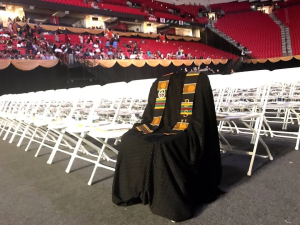
Lt. Collins’ graduation gown at Bowie State University’s 2017 ceremony. (Photo courtesy of Neal Augenstein, WTOP, & AP Images).
Emma:
…I feel like white men specifically have started to not evolve in the same way because this society coddles them so much. It gives them such privilege…
Dawn:
He considered it an honor to be a military officer. No one gave him anything. He earned that.
Emma:
And that’s a tough thing to earn.
Dawn:
…It was a tough thing. Now that I have learned more of the rigors of an ROTC cadet… It’s tough. It is not something that everyone can do. I couldn’t do it!
Emma:
I couldn’t do it. <Laugh>
Dawn:
I know people say, “Thank you for your service” to our military, but it’s more “Thank you for your sacrifice”. Because it’s a sacrifice.
Emma:
Was there a reason that Richard chose the Army specifically?
Dawn:
Not that I know of, no. Way back in high school, he knew he wanted to be a part of the military… That was his trajectory.
I have friends that have gone into different fields and they’ve always said that they wanted to be in that field of study. I enjoyed the sciences, so I knew I was gonna do something in the science realm… I am lucky enough to have been able to enjoy my career and like what I do.
Emma:
…Would you consider Richard’s murder resolved? Is everything wrapped up with that?
Dawn:
No. No, because the judge called it– what did he say? First degree murder, and did not say, “without parole.” The murderer can be paroled. As a matter of fact, he’s already appealed twice. Twice.
When you say “pay your debt to society”, I wanna ask… You took away a military officer. You took away my son. What’s the debt to this family? I’ll never get over that until I transition. Never. Never.
Again, my family is very, very close. Very close. The long-term ramifications of what that did to our family, my nieces, my daughter…
So Emma, I will say to you, oftentimes these things are done and people think, “Oh, okay, time has passed…”
What about the victims and the survivors? What about the victims and survivors?
I can go on and on and on – I’ve met victims and survivors from Pittsburgh, from Buffalo, from the Sikh temple, victims and survivors. It seems that this society often forgets about the victims and the survivors.
Then you hear the platitudes, “Time heals all wounds.” Really?
So Emma, Mrs. Collins does a lot of looking and smiling and shaking her head, ’cause I said, “You’ve not walked in my shoes.”
I actually heard, if I’m remembering correctly, “Oh, the murderer made a mistake.” Really? We call murder a mistake? Mm-mm… That’s why I fight so hard in what I do, why that hate crime law had to be changed, why I continuously speak out about hate and what it does.
Emma:
…That wasn’t a mistake. That was a series of choices. I remember now you said that the murderer still had the possibility of parole. I’m renewing my offer that if you ever need someone to go to the parole board and say, “…no!” <laugh>…
Dawn:
Thank you. Thank you. Because I’m trying to stay on top of that. I intend to be front and center and say, “Look what you took away from society. Look what you took away from this country.”
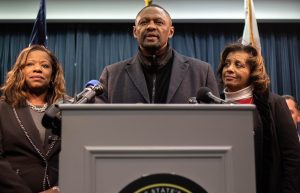
December 18, 2019 – Lt. Collins’ parents give a press conference with Prince George’s County State’s Attorney following the guilty verdict in their son’s murder case. (From left to right: State’s Attorney Aisha Braveboy, Lt. Collins’ Richard Collins, Jr., and Lt. Collins’ mother Dawn Collins).
Emma:
He ripped a gaping hole in the country… Could you go more into your work on changing the hate crime legislation after the hate crime charge was thrown out?
Dawn:
I worked with now Judge Leticia Allen and State’s Attorney Aisha Braveboy [from Prince George’s County].
When [the hate crime charge was thrown out], I’m gonna tell you, we were devastated. It was, it was like, “…what? You had video, you had witnesses, you had the stuff on [his] phone!”
So we lobbied, we worked, I talked, they talked, and we got the hate crime law changed in the state of Maryland. It’s named after my beloved son. It won’t be used for him, but for all those monsters that choose to think that the other should not exist.
If there’s such a thing as Lt. Collins looking down, [he’s saying], “See, I told you not to mess with my mom!”
I am so very grateful [to] Judge Allen for working with us. I take it as a privilege to know these two ladies – to see the heart of this grieving mom, and knowing that we had to do something. We’re also grateful to many other organizations and individuals who gathered people to testify, including the Southern Poverty Law Center (SPLC), the Lawyer’s Committee Under Civil Rights, the Anti-Defamation League (ADL), Dr. Rayshawn Ray, and the Leadership Conference on Civil & Human Rights.
Emma:
And the substance of that law change, it’s that hate only has to be a factor in [committing the crime]?
Dawn:
Correct…
Emma:
I mean, that makes sense to me. I was telling my family Richard’s story recently, and whenever I mention the aspect of the hate crime, they look at me funny… They’re happy that the law’s changed, but they don’t understand how that was ever the law.
Dawn:
You wanna know something, Emma? I don’t either. <Laugh> This is my contention and I’m no lawyer, but – you and I are not having this conversation [just] because I wanna talk to you. Well, there are many, many, many factors why we are having this conversation. You didn’t get up this morning just because your eyes opened…
Emma:
I feel like they should have thought about the spirit that the legislators were writing this law in. I don’t quite think that would’ve been their spirit, but…
Dawn:
…Well, you know, Emma, there was a time in this country where you and I could not have had this conversation, so <feminine rage chuckle>…
Emma:
That is very true… How does Richard’s story fit into the broader story of our current human experience? What larger story does Richard’s story help to tell?
Dawn:
I think – people need to take the time to have a conversation and know the other. That’s all it takes. Stop yelling… Take the time. You don’t have to do it the way Mrs. Collins does it. But take the time… Because first thing, I think: we’re all human, and we want the very, very best for our families. If you love your family, you want the best for them.
Just in speaking with you, I didn’t know you had an interest in food science. But you do, and you and I can talk for hours. At not one time will you say, “Oh, you’re a Black woman.” That will never enter into the conversation. We’re talking about food science.
So, again, stop blaming the other and open your mind. You would be amazed at how much you could learn and how much you would feel better about yourself.
Emma:
That’s true too. I like learning about other people. The more you learn, the more you understand that you don’t know. To me, people who choose to be violent, have closed themselves off to any sort of new experiences that might humble them.
Dawn:
Correct. That’s why… the purveyors of hate-fueled violence are targeting predominantly white institutions. That is so egregious to me. Universities are a place that you go to open your mind. I’m not gonna say you’re gonna agree with everything every professor says, but open your mind to the thought process and learn and stop being closed.
I don’t know if you know this, Emma – the murderer was in the School of Public Health. He was a student in the School of Public Health.
You are talking about being a public servant? Really?
Emma:
No. He doesn’t know what that word means, “public service”. It also boggles my mind how you can be immersed in a public health education and not develop more empathy! I don’t get it, but I don’t wanna get it. I don’t wanna get him.
Dawn:
No, you don’t… But yes: I was informed by the Dean of the School of Public Health that he was a public health student.
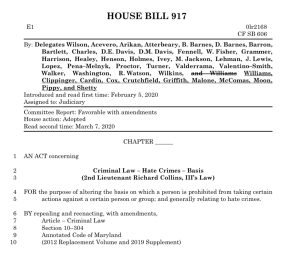
The introduction to the law named after Lt. Collins. It specifies that hate does not have to be the sole motive in a crime to be considered a hate crime.
Emma:
I can’t imagine him as any sort of medical professional or scientific mind or anything. He doesn’t have the empathy for it. He doesn’t have the empathy or the substance of humanity to do that. No, he’s exactly where he belongs.
What is next for you? How else are you carrying on Richard’s story?
Dawn:
Again, it’s so important to me for the victims and survivors of hate, that their voices are heard. My husband and I had the very distinct honor of being called Uniters Against Hate: we were honored by the White House, the Biden administration.
Emma:
Congratulations!
Dawn:
You can go on the White House website and look for Uniters Against Hate, and you will see my husband and my picture there. We got to speak about Richard’s story at the White House.
We also have a nonprofit in his name. Anyone listening to this, go on our website and look at the wonderful things that we’re doing. I am so thrilled.
We have the Social Justice Alliance between the University of Maryland College Park and Bowie State; and that’s professors, students, [and] faculty involved in conversations, these very difficult conversations. This year, the symposium will be entitled, “Social Justice in the Entertainment World”… One of the speakers is Laura Coates. She’s on CNN, I think it is. Keisha Knight Pullum. So I’m thrilled that we are able to do that work.
Something else that’s very near and dear to me: there is a $1 million scholarship for ROTC students in the state of Maryland. Because of that wonderful, wonderful scholarship, this is exciting: over 265 men and women have become military officers because of that scholarship.
Emma:
That’s incredible.
Dawn:
It is. It is. So we are continuing to not be silent in this realm and understanding that we are more powerful together. I can’t stress that enough.
I wish I could go back in time and change it. I would’ve taken that knife for my son so that he could live. But he’s not here, and I refuse to be quiet.
I’m not gonna hear, “I made a mistake”. No. And again, I say to you – when the hate crime charge was thrown out – to clap and high five? Or the defense refusing to call him lieutenant? I know that those are tactics, but still, as I expressed to the judge, “You earned the title, ‘Your Honor’. This is your courtroom. My son earned that title. Wasn’t given to him, he earned it.”
Emma:
You can do your job as a defense attorney without being callous or unempathetic or rude. And I found the murderers’ attorneys to be those things…
I understand that what they were doing was a tactic, but there are certain things that you should leave out of your tactics. Saying someone’s name correctly is one of them…
Thank you so much for sitting down with me to talk about Richard. I loved hearing about him. I’m of the belief system that he is somewhere in the ether looking down and he knows exactly what you and your family are doing and, and is all the things you believe him to be thinking.
Dawn:
So Emma, as you notice, I’ve never said my son died. I say [he] transitioned. That’s just me. What I believe – the spirit and the essence of him is still very much here, and I’m carrying on in that realm.
Take a look at what’s being offered at University of Maryland: Collins Plaza. I don’t know if you saw the area there in dedication to him. It’s right there on Regents Drive. So that’s there. They’re gonna do something else at Bowie State in his honor as well. So he’s leaving his footprint all along.
Emma:
Good. He deserves it.
Dawn:
Yes, he does.
Further Reading:
- https://www.chronicle.com/article/bowie-state-sends-hundreds-of-graduates-out-into-the-world-and-mourns-another/
- https://www.thecommunityfoundation.org/news/forward-with-hope
- https://dbknews.com/2022/05/19/lt-richard-collins-iii-plaza-dedication/
- https://www.baltimoremagazine.com/section/gamechangers/dawn-and-richard-collins-nonprofit-honors-sons-legacy/
- https://dbknews.com/2020/02/07/maryland-hate-crime-law-richard-collins-bill-annapolis-hearing/
